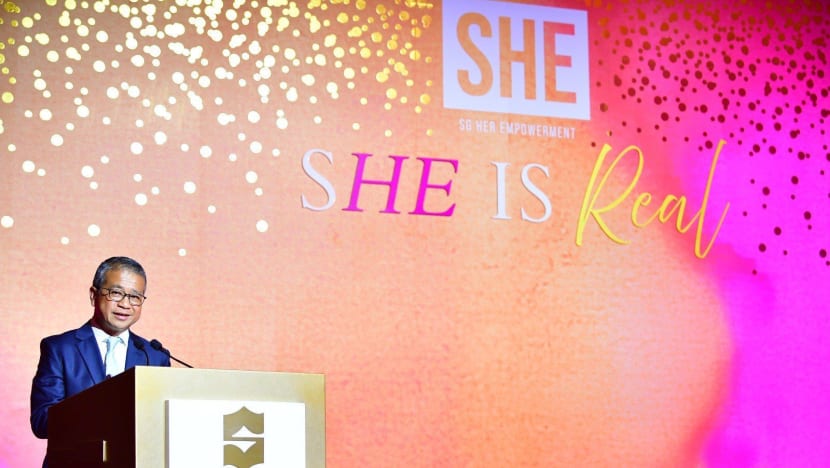- Joined
- Sep 2, 2023
- Messages
- 3,317
- Points
- 113
https://www.channelnewsasia.com/singapore/edwin-tong-diversity-inclusion-dei-trump-us-5059906
Rollback of diversity programmes will 'deepen divisions' and 'exacerbate inequality': Edwin Tong
Some top US firms have dropped mentions of diversity, equity and inclusion (DEI) programmes from their annual reports since US President Donald Trump was re-elected.
 Minister for Culture, Community and Youth Edwin Tong. (Photo: CNA/Raydza Rahman)
Minister for Culture, Community and Youth Edwin Tong. (Photo: CNA/Raydza Rahman)
Listen
5 min

Ng Hong Siang
11 Apr 2025 09:28PM (Updated: 11 Apr 2025 11:29PM)
Read a summary of this article on FAST.
FAST
SINGAPORE: A rollback of diversity, equity and inclusion (DEI) programmes will "deepen divisions" and "exacerbate inequality", Minister for Culture, Community and Youth Edwin Tong said on Friday (Apr 11).
Since taking office in January, US President Donald Trump's administration has rolled back nearly 80 executive orders from the Biden era, many of which supported DEI programmes.
Major corporations like Pepsi, General Motors, Google, Disney, Intel and PayPal have responded by scaling back or removing DEI references in their annual reports to investors.
Dismissing DEI frameworks "risks sending the wrong signal to the rest of the world at a time already characterised by heightened emotions and increasing polarisation, casting doubt over gender equality and equity as an international priority", Mr Tong said at a fundraising dinner for non-profit organisation SG Her Empowerment (SHE).
Pushing a divisive rhetoric of "us" vs "them" may undo decades of hard-fought gains, he added.
International norms and consensus around ideas of equality and equity have come under attack in the past couple of months, he said.
As a result of shifts in the US political leadership, there has been a "massive rollback" of DEI programmes in the US federal government, he said, adding that this has spilt into the private sector.
It can have cross-border effects, especially when some companies have an overseas presence, the minister noted.
He cited a Financial Times report that said some of the top companies in the S&P 500 index have reduced or dropped DEI terms in their annual reports since Mr Trump's re-election.
"What remains troubling to me, is that these companies readily axed the DEI programmes because of the change in political culture and mindsets. That suggests to me that the DEI programmes existed only because they were good optics. I do not think that it is acceptable," he said.
Proponents of the rollback of DEI justify it on the basis that DEI is discriminatory, and should be scrapped in favour of a “colour blind and merit-based” society, Mr Tong said.
"Sounds good, but what is it really in practice? I think this misses the point of DEI completely," he added.
"In Singapore, we recognise that there are invisible biases and institutional discrimination that inhibit the development of a truly fair and meritocratic society.
"By assuming that the playing field is level to start with, which may often not be the case, this ignores the lived experiences of those which DEI was designed to serve and benefit."


"It is something we have been working on for many years to achieve. I think it is important to build that level playing field for all Singaporeans, women and men, young and old, able-bodied and differently abled, so that no one is left behind," said Mr Tong.
"Everyone ought to have an equal opportunity to chase their aspirations, and realise their potential, regardless of where you may start in life, age, economic status or ability."
Singapore has been "steadily building inclusion ... and reshaping norms", he added.
He noted that Singapore ranked first in the Asia Pacific and eighth globally in the 2023/2024 United Nations Human Development Report’s Gender Inequality Index.
"On the ground, the gender pay gap has continued to shrink, while women’s representation in leadership roles has increased. Of course, there is a lot more work to be done, but I think we have come quite far, and we are now quite well-established."
Singapore has also been making strides to improve digital inclusion. Technology can be a dividing, divisive line between those who can and cannot navigate the digital space.
"To ensure that all Singaporeans can benefit from digital opportunities, the government has introduced, among others, the DigitalAccess@Home scheme.
"This is a scheme to provide subsidised broadband and digital devices for lower-income households," Mr Tong said.
Programmes such as Seniors Go Digital have also equipped seniors with digital skills.



Since 2021, the government has also provided a wage offset to eligible employers under the Enabling Employment Credit scheme. This goes towards hiring persons with disabilities, to help offset the wage for employers and incentivise them to hire persons with disabilities.
He said it is "more important than ever" for Singapore to support organisations such as SHE.
"SHE has also been a vocal advocate about women’s issues, facilitating dialogue and research on important topics, such as its research studies on gender mindsets and online harms, in the past few years.
"They have been helpful in driving evidence-based reforms and policy development on our part," said Mr Tong.
Rollback of diversity programmes will 'deepen divisions' and 'exacerbate inequality': Edwin Tong
Some top US firms have dropped mentions of diversity, equity and inclusion (DEI) programmes from their annual reports since US President Donald Trump was re-elected.

Listen
5 min

Ng Hong Siang
11 Apr 2025 09:28PM (Updated: 11 Apr 2025 11:29PM)
Read a summary of this article on FAST.
FAST
SINGAPORE: A rollback of diversity, equity and inclusion (DEI) programmes will "deepen divisions" and "exacerbate inequality", Minister for Culture, Community and Youth Edwin Tong said on Friday (Apr 11).
Since taking office in January, US President Donald Trump's administration has rolled back nearly 80 executive orders from the Biden era, many of which supported DEI programmes.
Major corporations like Pepsi, General Motors, Google, Disney, Intel and PayPal have responded by scaling back or removing DEI references in their annual reports to investors.
Dismissing DEI frameworks "risks sending the wrong signal to the rest of the world at a time already characterised by heightened emotions and increasing polarisation, casting doubt over gender equality and equity as an international priority", Mr Tong said at a fundraising dinner for non-profit organisation SG Her Empowerment (SHE).
Pushing a divisive rhetoric of "us" vs "them" may undo decades of hard-fought gains, he added.
International norms and consensus around ideas of equality and equity have come under attack in the past couple of months, he said.
As a result of shifts in the US political leadership, there has been a "massive rollback" of DEI programmes in the US federal government, he said, adding that this has spilt into the private sector.
It can have cross-border effects, especially when some companies have an overseas presence, the minister noted.
He cited a Financial Times report that said some of the top companies in the S&P 500 index have reduced or dropped DEI terms in their annual reports since Mr Trump's re-election.
"What remains troubling to me, is that these companies readily axed the DEI programmes because of the change in political culture and mindsets. That suggests to me that the DEI programmes existed only because they were good optics. I do not think that it is acceptable," he said.
Proponents of the rollback of DEI justify it on the basis that DEI is discriminatory, and should be scrapped in favour of a “colour blind and merit-based” society, Mr Tong said.
"Sounds good, but what is it really in practice? I think this misses the point of DEI completely," he added.
"In Singapore, we recognise that there are invisible biases and institutional discrimination that inhibit the development of a truly fair and meritocratic society.
"By assuming that the playing field is level to start with, which may often not be the case, this ignores the lived experiences of those which DEI was designed to serve and benefit."
Related:

Trump administration’s move to cut diversity programmes having a chilling effect, say rights groups

Commentary: The real test for DEI is here. Many companies are failing
BUILDING A LEVEL PLAYING FIELD
Mr Tong said that building a fairer and more inclusive society is constantly a work in progress."It is something we have been working on for many years to achieve. I think it is important to build that level playing field for all Singaporeans, women and men, young and old, able-bodied and differently abled, so that no one is left behind," said Mr Tong.
"Everyone ought to have an equal opportunity to chase their aspirations, and realise their potential, regardless of where you may start in life, age, economic status or ability."
Singapore has been "steadily building inclusion ... and reshaping norms", he added.
He noted that Singapore ranked first in the Asia Pacific and eighth globally in the 2023/2024 United Nations Human Development Report’s Gender Inequality Index.
"On the ground, the gender pay gap has continued to shrink, while women’s representation in leadership roles has increased. Of course, there is a lot more work to be done, but I think we have come quite far, and we are now quite well-established."
Singapore has also been making strides to improve digital inclusion. Technology can be a dividing, divisive line between those who can and cannot navigate the digital space.
"To ensure that all Singaporeans can benefit from digital opportunities, the government has introduced, among others, the DigitalAccess@Home scheme.
"This is a scheme to provide subsidised broadband and digital devices for lower-income households," Mr Tong said.
Programmes such as Seniors Go Digital have also equipped seniors with digital skills.
Related:

Revised building codes to increase accessibility and support for nursing mothers, people with disabilities

Fall in positive attitudes towards people with disabilities in the workplace: MSF report

People with disabilities to get more support with finding jobs, living independently in community
He also pointed out the SG Enable’s Open Door Programme, which provides grants and employment support services to organisations that hire persons with disabilities.Since 2021, the government has also provided a wage offset to eligible employers under the Enabling Employment Credit scheme. This goes towards hiring persons with disabilities, to help offset the wage for employers and incentivise them to hire persons with disabilities.
He said it is "more important than ever" for Singapore to support organisations such as SHE.
"SHE has also been a vocal advocate about women’s issues, facilitating dialogue and research on important topics, such as its research studies on gender mindsets and online harms, in the past few years.
"They have been helpful in driving evidence-based reforms and policy development on our part," said Mr Tong.




